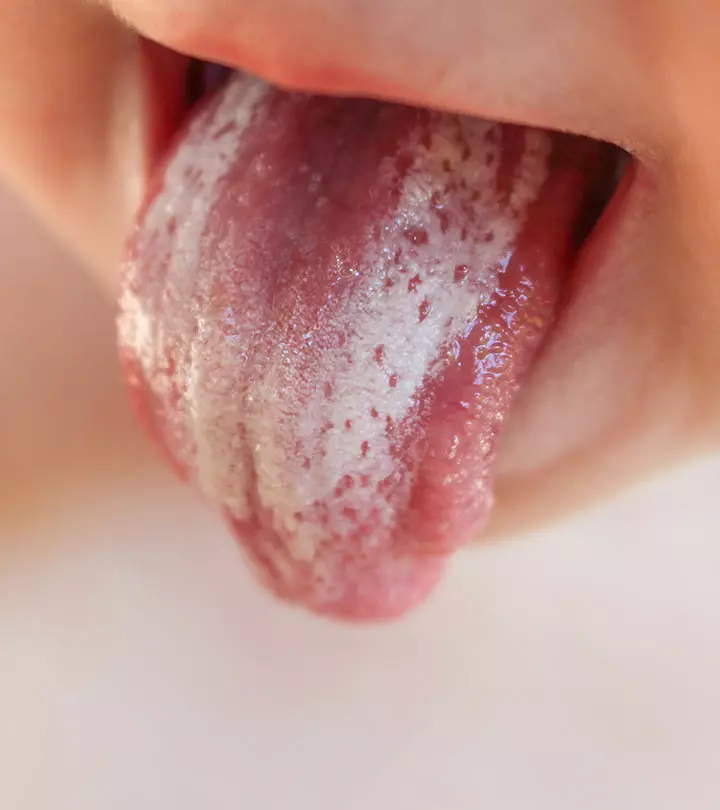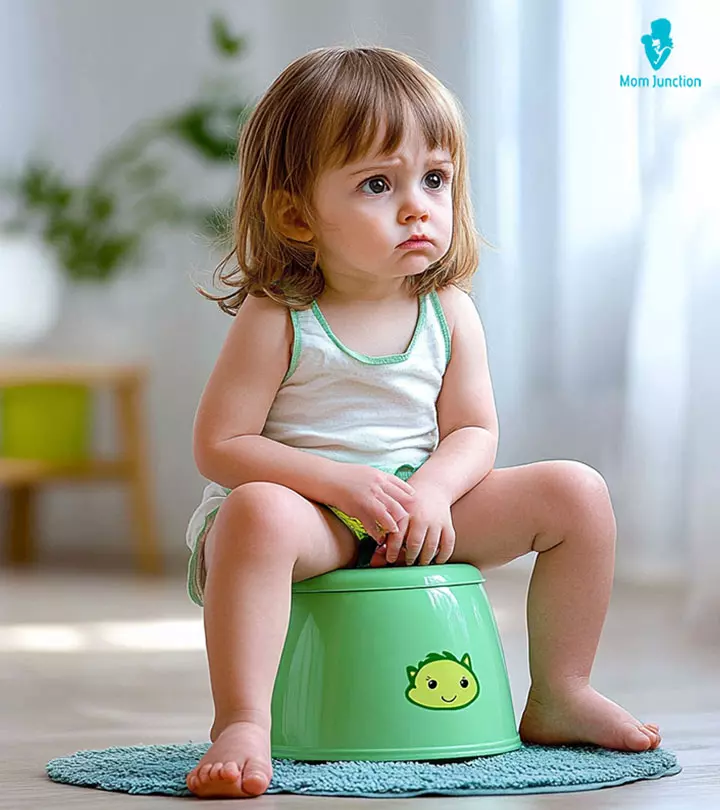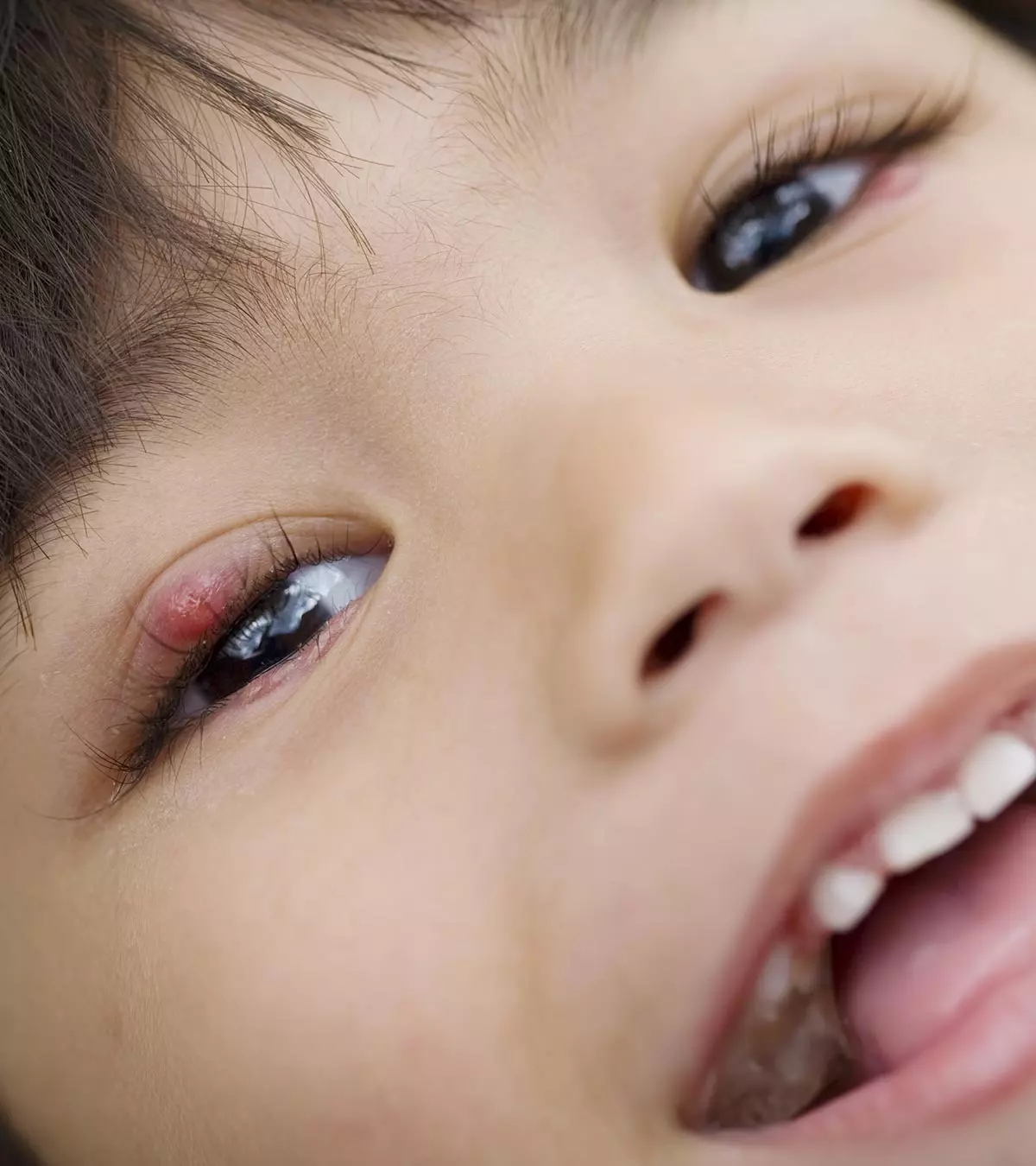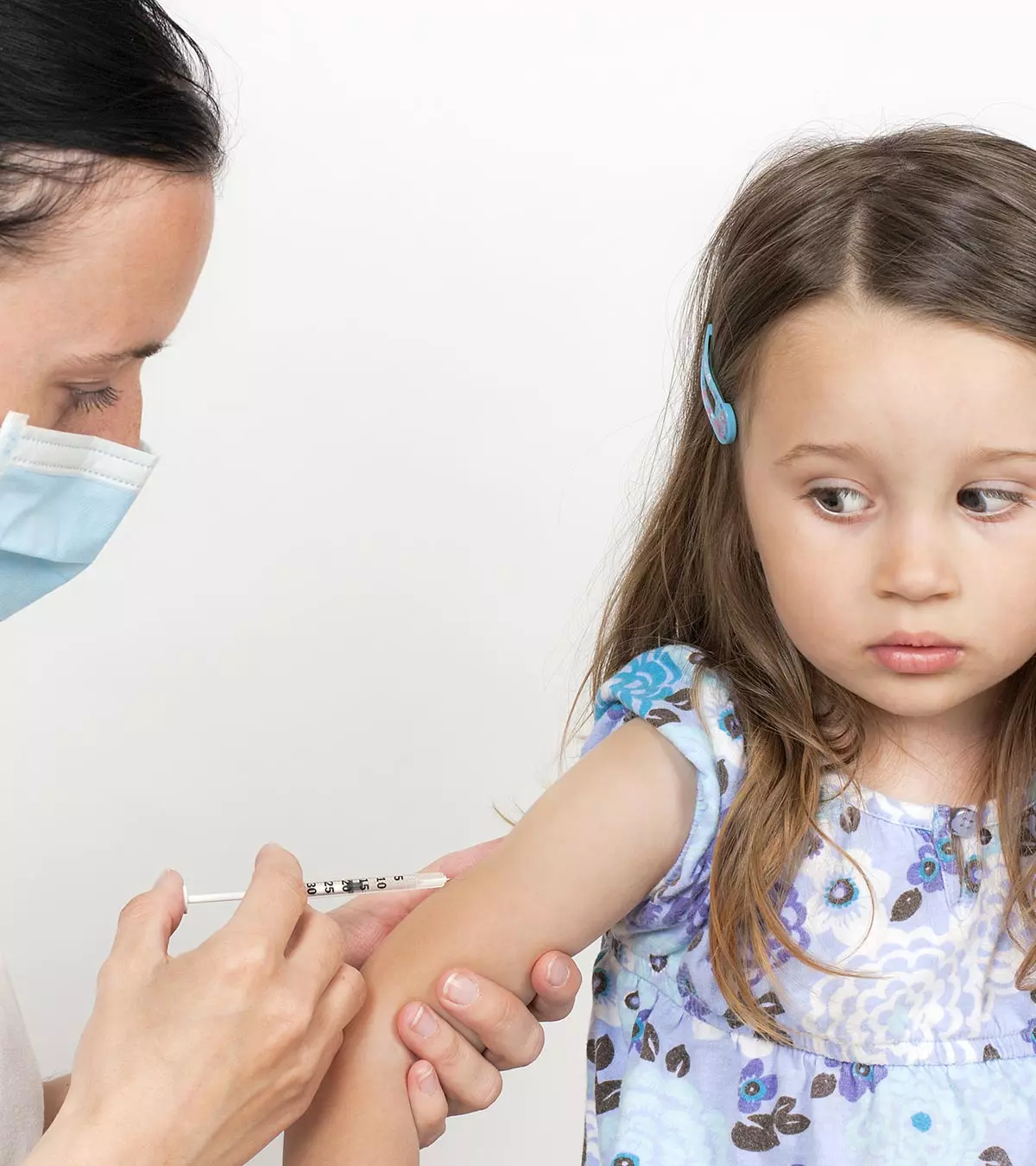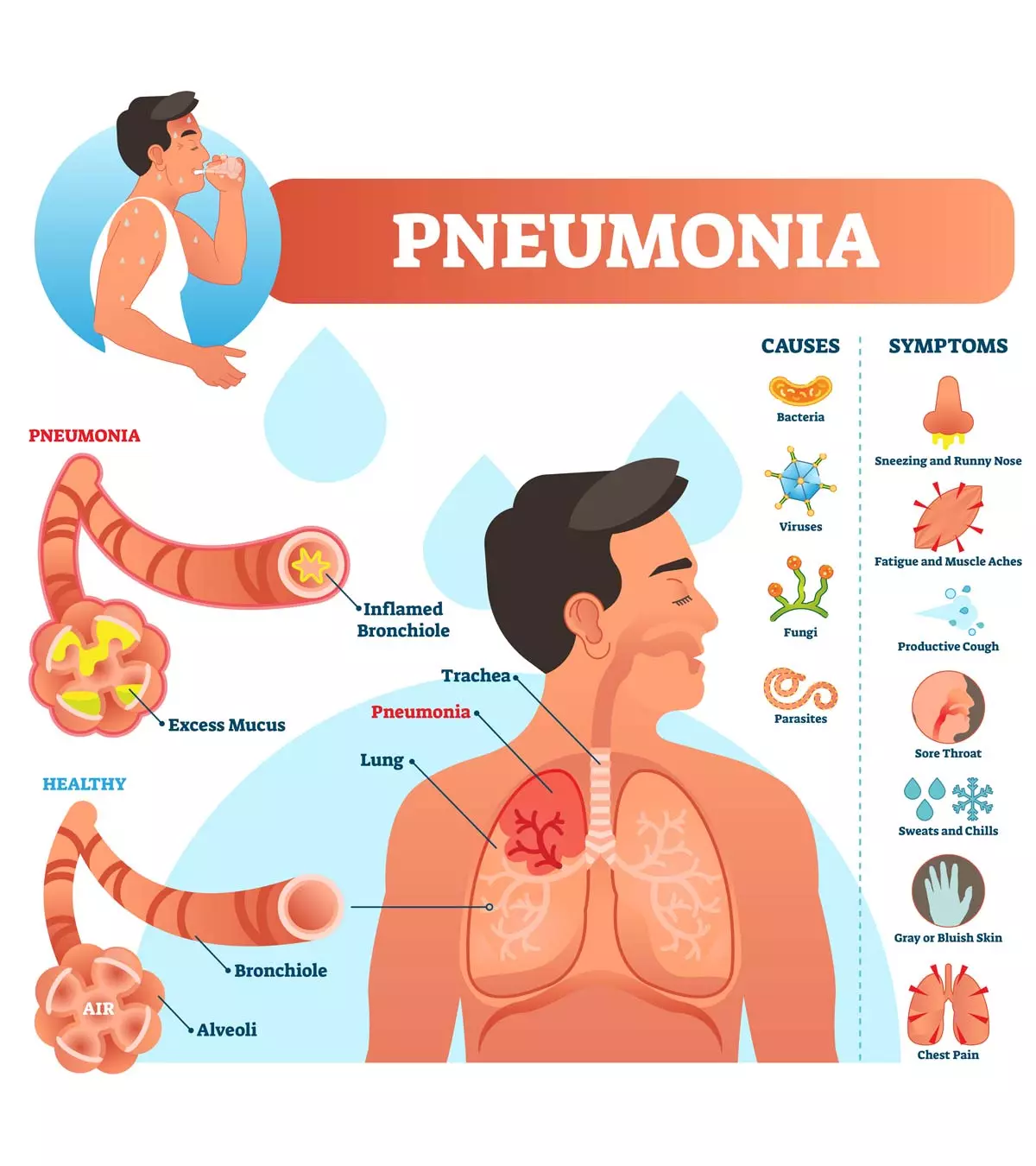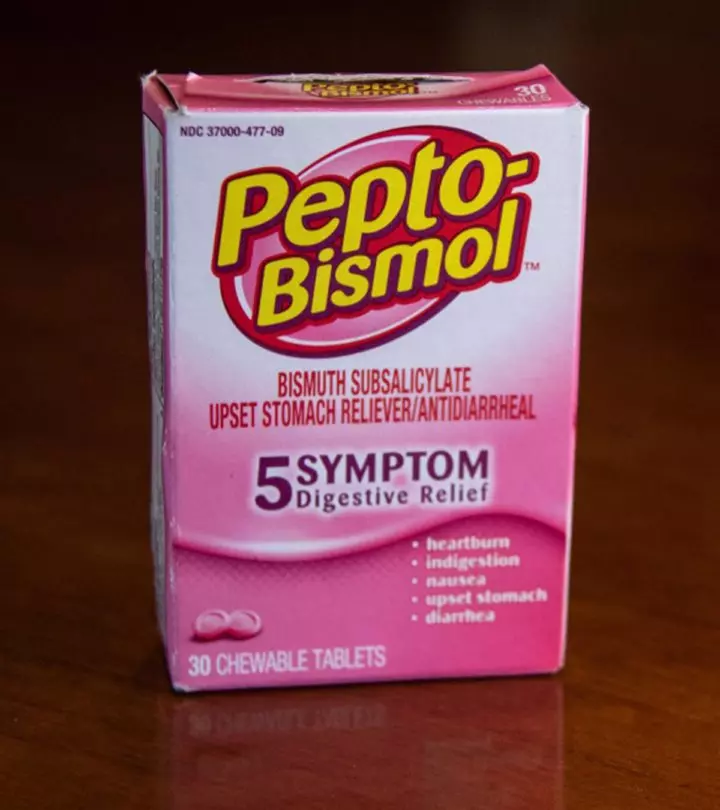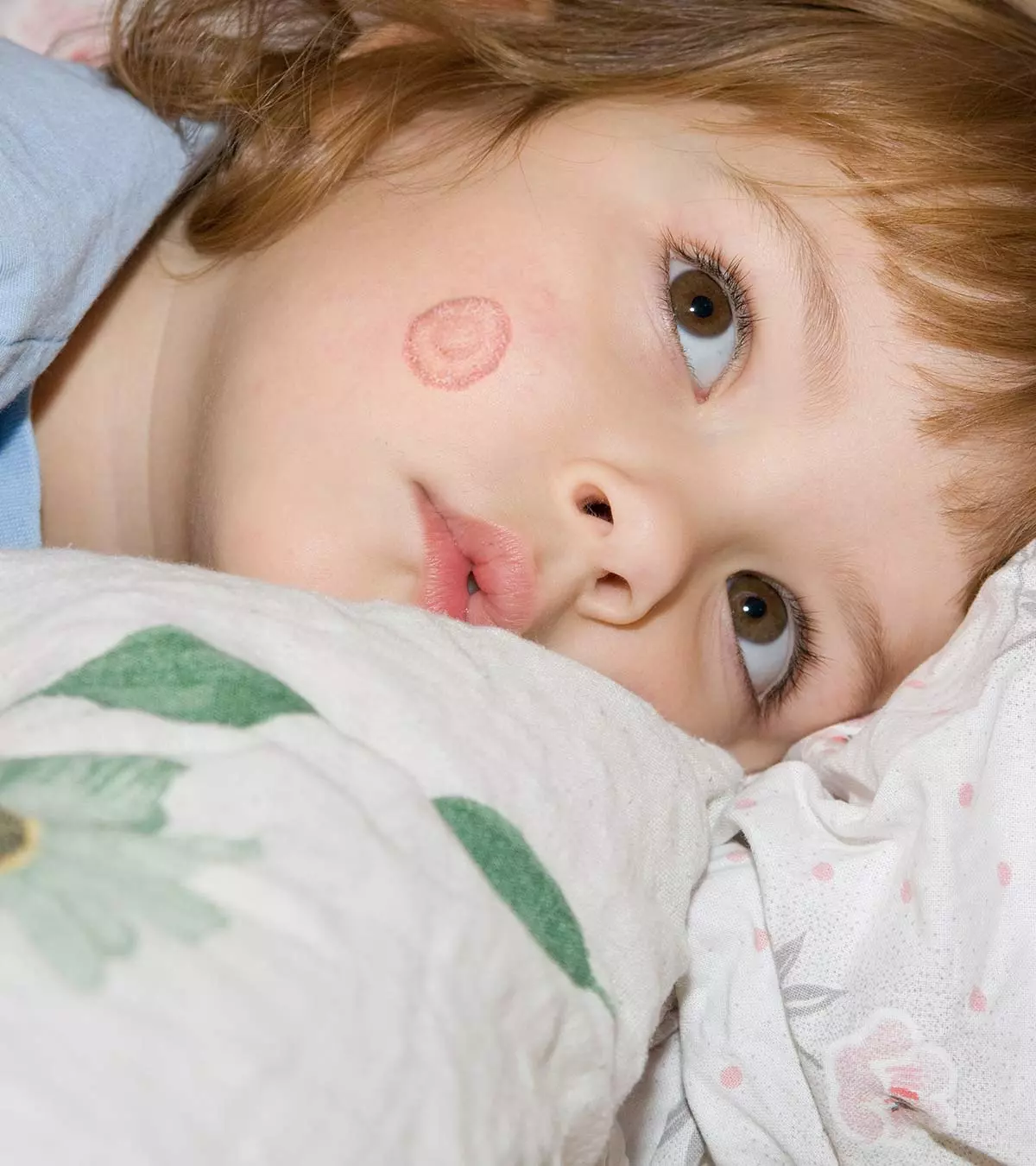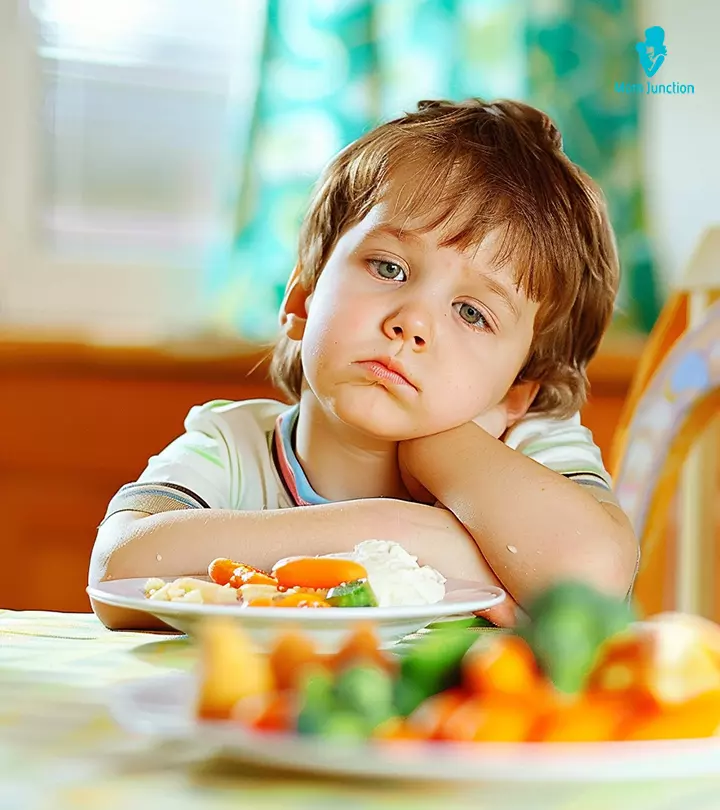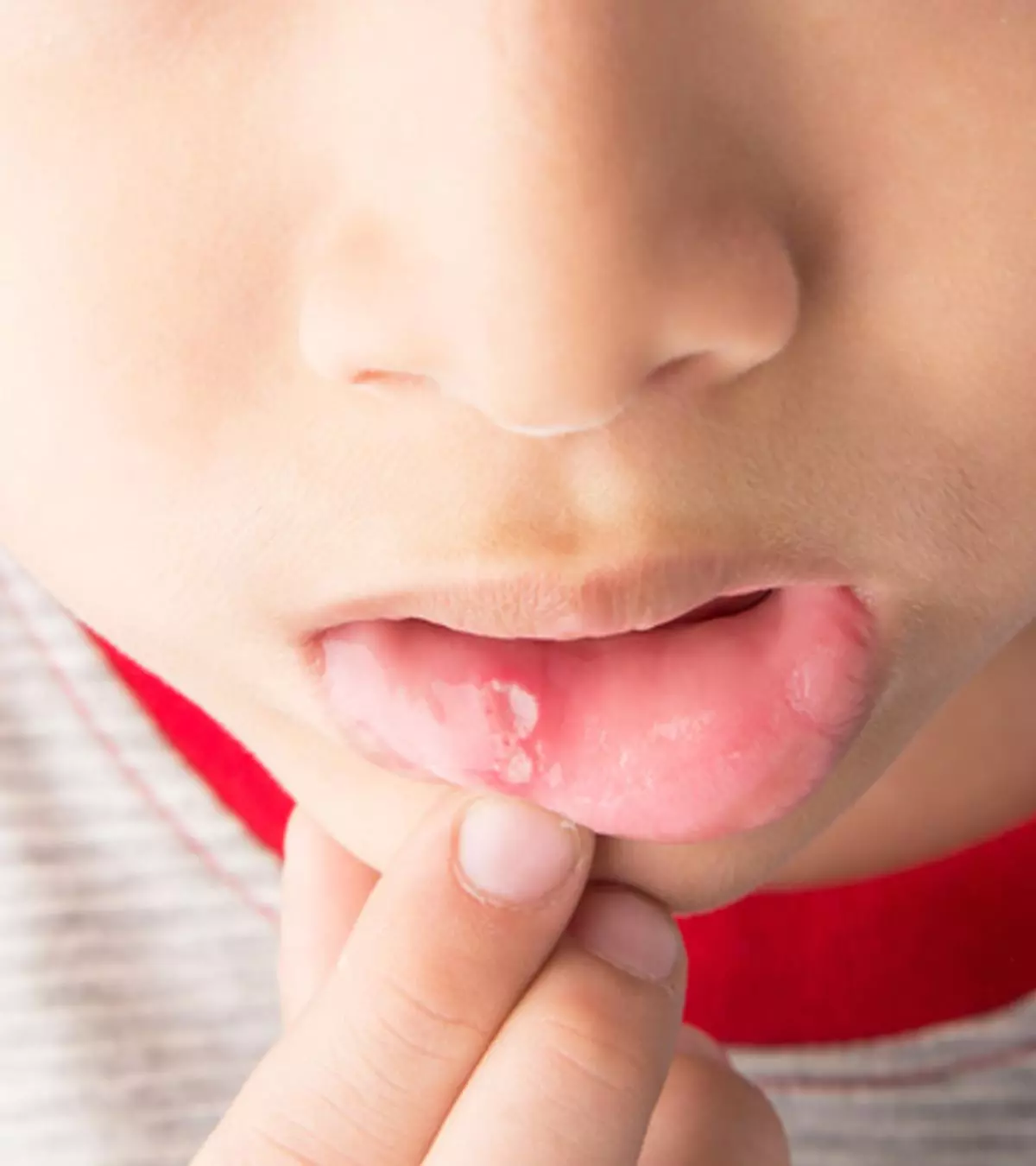
Image: ShutterStock
Canker sores in kids can be painful and interfere with drinking and eating. These tiny, noncontagious lesions on the oral mucosal layer are also called aphthous ulcers or mouth ulcers. Most canker sores resolve on their own within one or two weeks (1). Most canker sores resolve on their own within one or two weeks (2). These may occur at any age but are more often seen in children and adolescents (3). Rinsing the mouth may help reduce the symptoms. However, it is recommended to consult a doctor and treat the underlying cause if your child keeps having canker sores. Continue reading to know more about canker sores’ causes, symptoms, treatment, and prevention and how to differentiate them from cold sores.
Key Pointers
- Children’s canker sores are painful oral lesions that are not contagious and can interfere with eating and drinking.
- Various factors can cause canker sores in children, including dietary deficits, unintentional cheek bites, food allergies, infections, and autoimmune diseases.
- Canker sores in children usually appear as round or oval lesions with red borders and yellow or white centers.
- Treatment options for children with canker sores include topical or oral medications, pain relievers, and home remedies.
- To prevent canker sores, parents should help their children reduce stress, practice good oral hygiene, and maintain a healthy diet.
- Parents should seek medical attention if their child’s mouth sores last more than two weeks, recur frequently, are large, painful, on the lips, or accompanied by a fever.
Causes Of Canker Sores In Children
The exact cause is not clear in most cases. Hereditary and environmental factors, such as certain food or allergens, can cause recurrent canker sores.
The possible causes of canker sores in children may include the following (4) (5).
- Dietary deficiency of iron, folate (folic acid or vitamin B9), cobalamin (vitamin B12), or zinc
- Accidental cheek bite
- Mucosal damage from incorrect brushing of teeth
- Injuries due to orthodontic braces
- Food allergies or sensitivities, commonly to coffee, nuts, eggs, chocolates, and fruits, such as citrus fruits and strawberries
- Sensitivity to compounds, such as sodium lauryl sulfate and alcohol found in oral hygiene products
- Hormonal changes in puberty
- Emotional stress
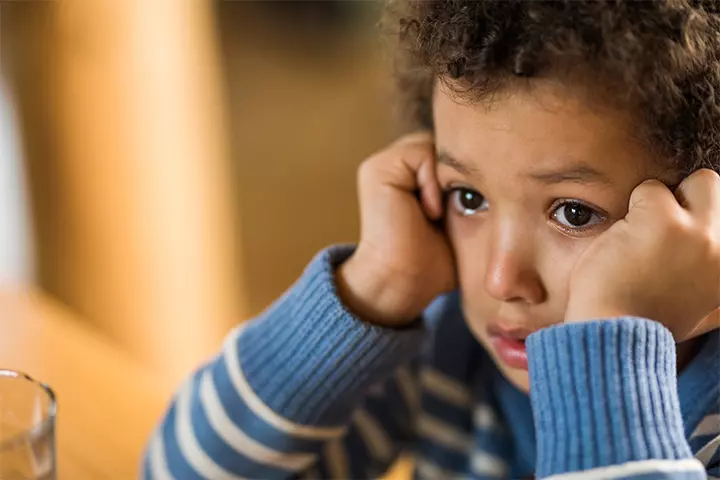
- Constipation can be a possible reason.
- Canker sores may run in families, thus increasing a child’s risk if the parents or siblings have them.
The following diseases and conditions that affect the immune system can also be the reason for canker sores (6).
- Autoimmune conditions, such as celiac diseaseiAn autoimmune and genetic condition characterized by an immune reaction to gluten, the protein found in barley, rye, and wheat , inflammatory bowel diseasesiA group of disorders that leads to intestinal swelling and chronic pain (ulcerative colitis and Crohn’s disease), and Behcet’s diseaseiA rare disease that causes swelling in blood vessels and tissues
- Infection from certain pathogens, such as Helicobacter pylori, and immunocompromised conditions, such as HIV/AIDS
Note:
Canker sores are not seen in herpes virus infection, which may cause cold sores in the mouth and lips.
Signs And Symptoms Of Canker Sores In Children
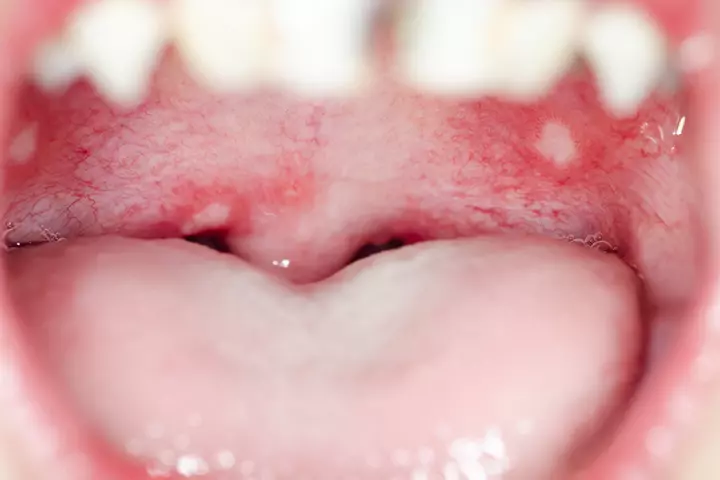
Canker sores are round or oval-shaped lesions with yellow or white-colored centers surrounded by red borders. They are seen under the tongue, inside the cheek, on the soft palate, or on the gums. The sores measure less than ¼ inch (6 millimeters) in diameter (7).
Pain is the primary symptom of canker sores. The child may have a burning or tingling sensation associated with the sores. Sometimes, burning can be felt before the lesions appear on the oral mucosal layer (4). The pain from the sores can make it challenging for children to consume food or speak comfortably (3).
Is It A Canker Sore Or A Cold Sore?
Cold sores or fever blisters can occur in clusters of many sores. These may merge to form large ulcers and lack proper borders and shapes. Cold sores in children are often seen on the lips, unlike canker sores, which mostly occur on the oral mucosal layer.
Cold sores due to herpes simplex virus type 1 are common among kids. These sores last for three weeks and heal without scarring. Fever, itching, sore throat, and swollen lymph nodesiSmall, bean-shaped structures that help the body fight infection and disease by filtering lymph fluid are often associated with herpetic cold sores in children (8).
Should Parents Worry About Canker Sores?
Occasional canker sores that heal within a week or two are not significant causes of concern in children.
Seek pediatric consultation in the following situations.
- Mouth sores lasting more than two weeks
- Recurrent or frequent canker sores
- Large canker sores
- Excessive pain
- Sores present on lips
- High fever and a feeling of sickness

Seek medical attention if your child has four or more ulcers, bloody crusts on the lips, red and swollen gums, sores on the outer lip, a single ulcer near a painful tooth, fever, a swollen face, or a large lymph nodeiA small, bean-shaped organ scattered throughout the body that acts as a filter, trapping harmful substances under the jaw. Also, seek care if symptoms start after taking a new medicine (7).
If you are unable to differentiate canker sores from cold sores, ask your child to avoid touching sores and teach them hand hygiene techniques since cold sores are contagious. Consult a pediatrician to determine the type of sores.
How Are Canker Sores Diagnosed?
Doctors can identify canker sores by visual inspection (4). If your child has severe and frequent sores, additional examinations are conducted to identify the underlying cause. Healthcare providers will choose the required tests based on other symptoms and individual factors.
If the canker sores are due to injuries caused by misaligned teeth or dental appliances, then the pediatrician may refer the child to a dentist.
Treatment For Canker Sores In Children
Minor canker sores are cured within a week or two without any treatment. Large sores may require medical care, which can include the following (9).
- Over-the-counter remedies for pain relief such as topical creams, gels, mouthwash, or pastes could help minor sores. Topical products with active ingredients, such as benzocaine, fluocinonide, or hydrogen peroxide, may also enhance healing.
- Mouth rinses containing corticosteroids are prescribed by a doctor to reduce pain and inflammation if multiple or more extensive sores are present.
- Vitamin and mineral supplementations are often prescribed to maintain oral health if dietary deficiencies are the cause for canker sores.
- Oral medications such as Carafate (sucralfate) or colchicine are used to treat severe canker sores.
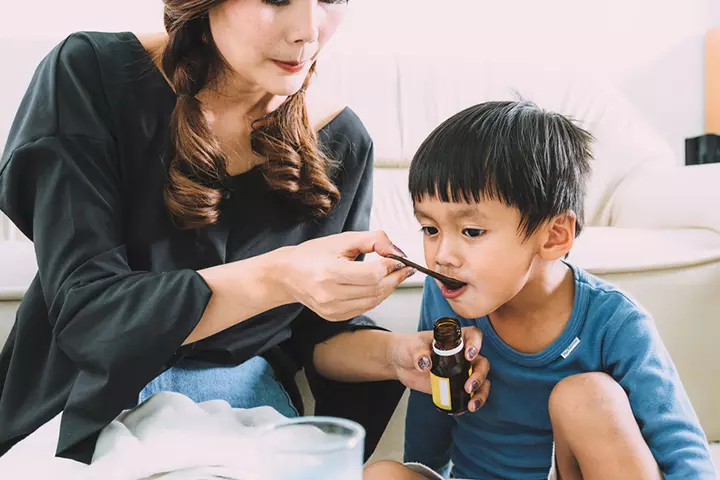
- Oral steroid medications are often given to control severe inflammation.
- Chemical or instrumental cautery is required for severe cases of canker sores.
In addition to these treatments, a study assessed the efficacy of 2% chlorhexidine gluconate gauze in treating pediatric oral ulcers. The report states, “The children were administered twice daily moistened gauze containing 2% chlorhexidine gluconate. Following treatment, the lesion heals within seven days. With any luck, the research results can be applied to infants afflicted with oral ulcers (10).” This suggests that antiseptic solutions like chlorhexidine gluconate may effectively manage oral ulcers in children.
 Point to consider
Point to considerSeek help from a doctor specializing in pediatric dentistry to choose the best method to cure canker sores in your child. Treatment may vary if any underlying disease or condition is detected. The sores may heal by themselves during the treatment of the underlying condition.
Home Remedies For Canker Sores
Below are some practical and natural approaches to managing canker sores in children, ensuring they feel better sooner and can get back to their daily activities without unnecessary pain (12) (13).
- Apply ice to reduce pain and swelling
- Avoid irritants like acidic, hot, and spicy food that may increase pain
- Rinse the mouth with salt water or baking soda rinse
- Use a soft toothbrush with sodium lauryl free toothpaste
- Eat soft and non-abrasive foods to avoid pain
A father of two and blogger who goes by the name ‘The Cool Science Dad’ shares effective tips that helped his daughter alleviate pain caused by canker sores. He recalls, “My wife and I talked with our daughter and gave her some tips on how to deal with the pain. It’s usually only painful when eating or rubbing the inside of your lips against teeth. I gave her some tips on certain foods (acidic foods such as some fruits, ranch dressing that bothered her yesterday, etc.) to avoid that can irritate the sore and cause pain and also that chewing on the other side of her mouth can help (i).”
Prevention Of Canker Sore In Children
By adopting proactive strategies, parents can help their children avoid the discomfort associated with these oral ulcers. The following tips may help reduce the canker sore risk in children (14).
- Follow a balanced diet that includes different nutrients.
- Follow healthy oral hygiene habits
- Seek dental care for misaligned teeth and follow dentist recommendations while using dental appliances
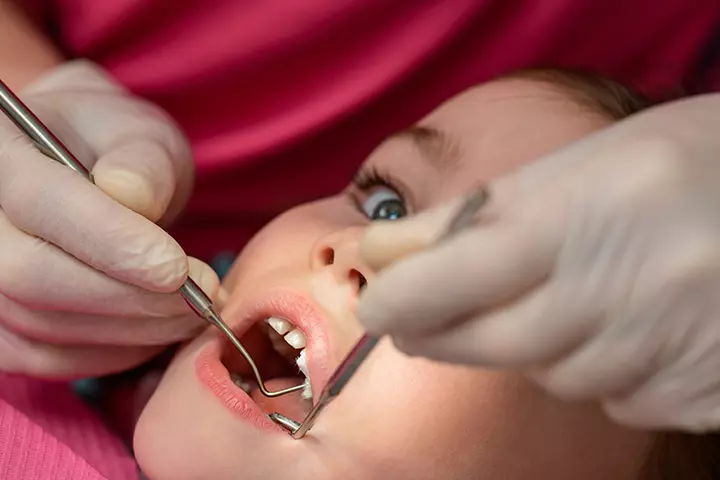
You may also give your kid vitamin and mineral supplements if it is recommended by the pediatrician.
Frequently Asked Questions
1. Does having canker sores suggest my child is sick?
If your child has severe canker sores or they get recurrent aphthous stomatitis, you must consult your pediatrician to check if they have any nutritional deficiency or other issues (13).
2. Are canker sores more common in children?
It cannot be said that canker sores are more common in children. However, children or teens between the ages of 10-19 may have outbreaks of canker sores (3).
3. Are canker sores a virus?
No, canker sores are not caused by viruses. Therefore, they are not contagious (15).
Canker sores in kids are lesions in the oral mucosaiThe inner layer of the mouth, which also covers the cheeks and lips that are usually not a significant cause of concern. However, they may cause pain during eating and drinking. Nutritional deficiencies, food allergies, or cheek bites may cause canker sores, which resolve in about a week or two. Speak to a doctor if the sores persist longer or become painful. The doctor may prescribe topical gels, mouthwashes, dietary supplements, dietary changes, or medications. Proper oral hygiene and a balanced diet may help prevent canker sores in children.
Infographic: Common Reasons For Mouth Ulcers In Children
Children may experience sores and mouth ulcers due to several other diseases, which usually present other notable symptoms. See the infographic below to understand better the various conditions that can cause mouth ulcers in children.

Illustration: Momjunction Design Team
Illustration: Causes Of Canker Sores In Children Its Symptoms And Treatment
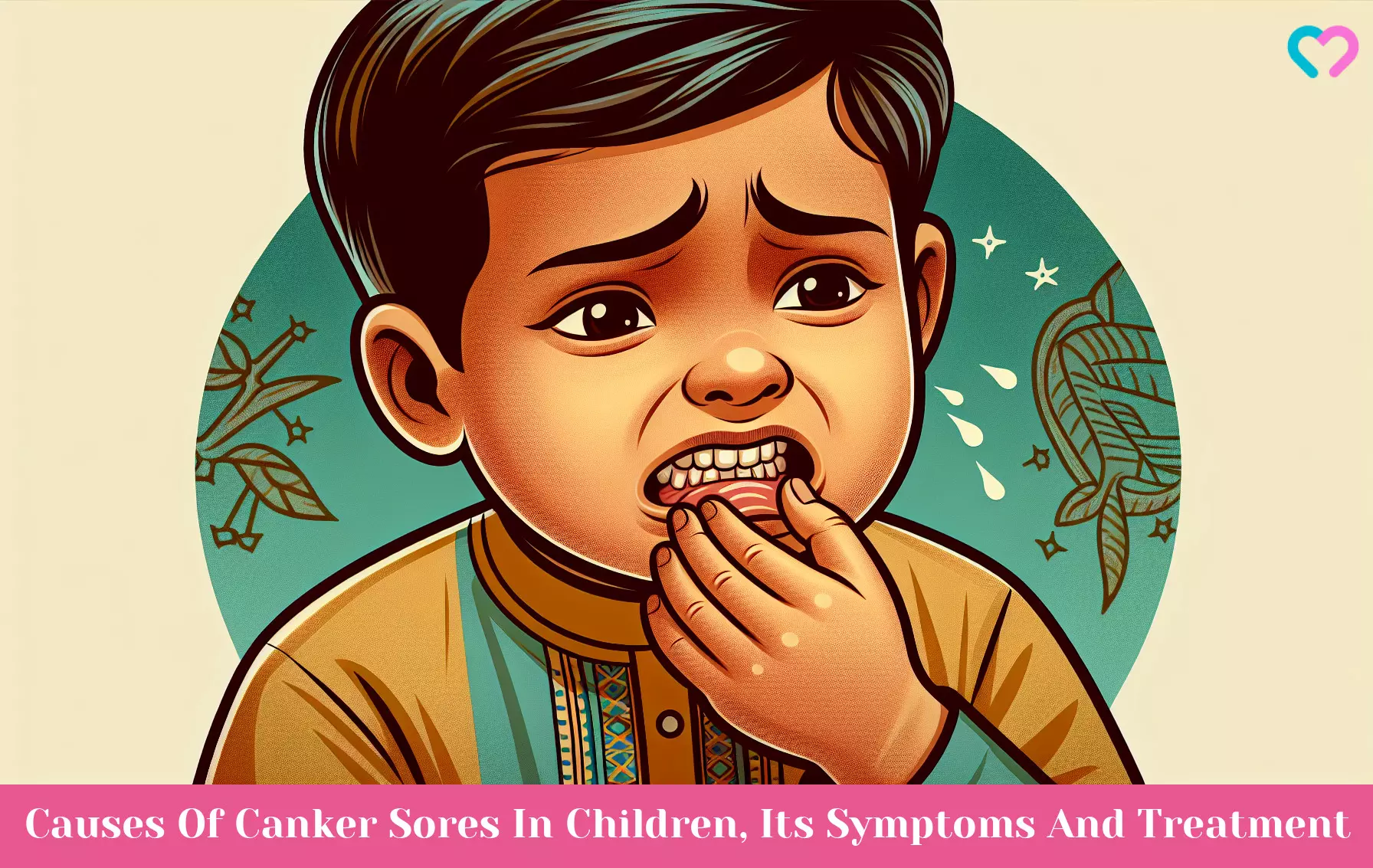
Image: Dall·E/MomJunction Design Team
Uncover important information baout canker sores in children including ways to prevent them from affecting your child, in this video.
Personal Experience: Source
MomJunction articles include first-hand experiences to provide you with better insights through real-life narratives. Here are the sources of personal accounts referenced in this article.
i. My daughter’s canker sore;https://coolsciencedad.blogspot.com/2013/11/my-daughters-canker-sore.html
References
- Overview: Canker sores (mouth ulcers).
https://www.ncbi.nlm.nih.gov/books/NBK546250/ - Canker sore.
https://medlineplus.gov/ency/article/000998.htm - Canker Sores (Aphthous Ulcers) in Children.
https://www.cedars-sinai.org/health-library/diseases-and-conditions—pediatrics/c/canker-sores-aphthous-ulcers-in-children.html - Overview: Canker sores (mouth ulcers).
https://www.ncbi.nlm.nih.gov/books/NBK546250/ - Zinc.
https://www.urmc.rochester.edu/encyclopedia/content?contenttypeid=19&contentid=Zinc - Mohamed Nasser Elsheikh and Magdy ElSayed Mahfouz; (2005); Prevalence of Helicobacter pylori DNA in Recurrent Aphthous Ulcerations in Mucosa-Associated Lymphoid Tissues of the Pharynx.
https://jamanetwork.com/journals/jamaotolaryngology/fullarticle/649480 - Mouth Ulcers.
https://www.stlouischildrens.org/health-resources/symptom-checker/mouth-ulcers - Herpes – oral.
https://medlineplus.gov/ency/article/000606.htm - Canker sores (mouth ulcers): Learn More – What can you do if you have a canker sore?
https://www.ncbi.nlm.nih.gov/books/NBK546251/ - Nendika Dyah Ayu Murika Sari and Putri Kusuma Wardani Mahendra; (2023); A case study of using chlorhexidine gluconate for mouth ulcer careA case study of using chlorhexidine gluconate for mouth ulcer care.
https://journal.unimma.ac.id/index.php/nursing/article/view/8954 - Mouth Ulcers.
https://www.seattlechildrens.org/conditions/a-z/mouth-ulcers/# - Canker sore.
https://ufhealth.org/conditions-and-treatments/canker-sore - Canker Sores (Aphthous Ulcers).
https://kidshealth.org/en/parents/canker.html - Mouth ulcers.
https://www.betterhealth.vic.gov.au/health/conditionsandtreatments/mouth-ulcers - Canker Sores 101: Causes and Treatment.
https://www.cedars-sinai.org/blog/canker-sores.html
Community Experiences
Join the conversation and become a part of our nurturing community! Share your stories, experiences, and insights to connect with fellow parents.
Read full bio of Dr. Garima Garg Seth
Read full bio of Dr Bisny T. Joseph
Read full bio of Swati Patwal
Read full bio of Anindita Ghatak










